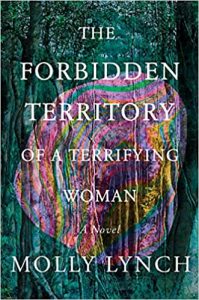Ian Mond Reviews The Forbidden Territory of a Terrifying Woman by Molly Lynch
 The Forbidden Territory of a Terrifying Woman, Molly Lynch (Catapult 978-1-64622-142-4, $27.00, 288pp, hc) June 2023.
The Forbidden Territory of a Terrifying Woman, Molly Lynch (Catapult 978-1-64622-142-4, $27.00, 288pp, hc) June 2023.
Like Hilary Leichter’s Terrace Story, Molly Lynch’s debut, The Forbidden Territory of a Terrifying Woman, draws on the existential angst of raising a family amid climate change. Lynch’s approach is not nearly as surreal as Leichter’s, but it does centre on a strange phenomenon: mothers across the globe vanishing without a trace. Ada is one such mother. When we meet her, she’s living with her husband, Danny, and her son, Gilles, in Michigan, where they enjoy a secure, middle-class life: Ada is a contract lecturer (she teaches art), Danny is a tenure-track professor. But Ada isn’t happy. She’s never much liked Michigan (she’d rather the family move to her hometown of Montreal), and with the news inundated with reports about ecological collapse, her thoughts and dreams are pre-occupied with what this will mean for her family, for her son:
She saw Gilles in a future when there was no oxygen. She saw him moving through an airless world as he was moving now, moonwalking, arms and legs in some slow-motion dance on this same planet but with no air.
If the threat of global warming isn’t frightening enough, Ada starts following reports of a missing woman, Raven Wallace, who disappeared on the way to pick up her son from daycare. It’s part of a global trend, mothers and wives walking out on their lives. Ada wants to talk to Danny about all this, her concerns for the planet, their marriage, their son, and the missing women, but he’s not listening, overcome with work-related stress. And then, one day, it’s Ada’s turn. Danny is abruptly woken up by his son Gilles asking for his mother, only to discover that Ada has vanished overnight.
The Forbidden Territory of a Terrifying Woman is a tremendously well-written novel. Lynch effortlessly evokes Ada’s anxious, cascading thoughts: her dislike of Michigan, her annoyance with Danny, her deep love for Gilles, and her obsession with the anthropocene and the missing women, starting with Raven Wallace. Lynch draws on dream imagery to significant effect: nightmarish visions of ecological collapse – ‘‘The sky burned, much too hot. Grain fields were dead. Nothing in the soil. No roots. Brown water rushed over dry land, swallowing’’ – but also dreams or hallucinations of a more mythic quality, where Ada gives herself to the Goddess Artemis, the ‘‘terrifying woman’’ of the title, becoming one with nature. When the narrative switches to Danny after Ada’s disappearance, Lynch strips back the language. We are given unfiltered access to Danny’s feelings of dread and bewilderment: his struggle to piece together why Ada left, his heart-wrenching efforts at hiding the truth from Gilles, his desperate search for his wife, leaning on close family, but also a new Federal unit established to investigate the disappearances. This duality of voice – immersive and confronting – provides an unvarnished portrait of a contemporary middle-class marriage, where neither partner can express their growing unease about the future.
But. We must return to the novel’s conceit: a phenomenon that, if my reading is correct, only affects cisgender married women: single mothers, queer couples, and trans and nonbinary folk are immune. A charitable reading would suggest that the vanishings occur only to ciswomen perhaps because these particular individuals are shackled by the patriarchy, by the desires and ambitions of their male partner. To an extent, this is conveyed through Danny’s reluctance to listen to Ada, her concerns about the environment, and the missing women. But this is implicit in the text; Lynch never teases out or even acknowledges that motherhood extends beyond ciswomen. Instead, the novel seems to take an essentialist attitude to motherhood by explicitly stating that the women who vanished all gave birth and are ‘‘all people with vaginas.’’ Again, it can be argued that this isn’t necessarily negating transwomen or mothers who don’t give birth. But this is also a work of fiction. Lynch has chosen the rules that define her phenomena; she could easily have broadened the definition to include a more diverse family of mothers. The fact that she hasn’t is something, as readers, we need to account for. And it’s a decision that bothers me because I believe the existential unease and primal forces that Lynch viscerally describes throughout the novel wouldn’t apply only to cisgender women.
So, while I can admire The Forbidden Territory of a Terrifying Woman, the evocative prose and deft character work, I stop short of loving the novel. Its narrow focus keeps me at arm’s length.
Ian Mond loves to talk about books. For eight years he co-hosted a book podcast, The Writer and the Critic, with Kirstyn McDermott. Recently he has revived his blog, The Hysterical Hamster, and is again posting mostly vulgar reviews on an eclectic range of literary and genre novels. You can also follow Ian on Twitter (@Mondyboy) or contact him at mondyboy74@gmail.com.
This review and more like it in the August 2023 issue of Locus.
 While you are here, please take a moment to support Locus with a one-time or recurring donation. We rely on reader donations to keep the magazine and site going, and would like to keep the site paywall free, but WE NEED YOUR FINANCIAL SUPPORT to continue quality coverage of the science fiction and fantasy field.
While you are here, please take a moment to support Locus with a one-time or recurring donation. We rely on reader donations to keep the magazine and site going, and would like to keep the site paywall free, but WE NEED YOUR FINANCIAL SUPPORT to continue quality coverage of the science fiction and fantasy field.
©Locus Magazine. Copyrighted material may not be republished without permission of LSFF.






